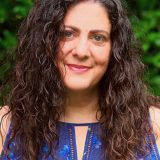My paternal line originated in Baghdad, Iraq, where the members of my father’s family and hundreds of thousands of other Jews coexisted peacefully with Muslims and Christians for centuries. But in June 1941, my grandparents and their children—my aunts Yehudit and Dalia—were nearly massacred in Baghdad, their birthplace, during the Nazi-inspired Farhud, when at least 180 Jews were slaughtered, and many hundreds injured.
During that harrowing two-day massacre, my family was saved, thanks to the courage of Hassan, a Muslim partner in my grandfather’s textile-coloring business. Risking his own family’s safety, Hassan sheltered my family in his home.
My Aunt Yehudit, just 3 years old at the time, remembers being disguised in Muslim attire and instructed to remain silent to conceal her Judaic Iraqi-Arabic dialect. She remembers, too, that her parents abandoned their shoes to blend in with their barefoot Muslim neighbors.
When my family came to live with Hassan, his family bought new pots and dishes so my grandmother could prepare kosher meals. Meanwhile, Yehudit formed a bond with Hassan’s 3-year-old daughter (who remained her close friend until Yehudit departed from Iraq 10 years later). Upon returning home two weeks after the Farhud, young Yehudit was delighted to discover that her favorite toy was still under her pillow, where she had left it.
The Farhud ended over 2,000 years of peaceful coexistence between Iraq’s Jewish minority and their Muslim countrymen. Antisemitism enveloped Iraq, and there were frequent public lynchings of prominent Jews. Life became insufferable. The Iraqi Jewish community dwindled from over 150,000 in 1940 to less than 2,000 by 1952, as Jews were forced to flee without their property or financial assets. Many arrived on Israel’s shores and were taken to live in tent cities (ma’abarot), where there was no infrastructure to provide water or heat.
My father, his brother and his two sisters were among the destitute children. Since their parents had stayed in Baghdad—perhaps hoping for better days—my aunts, father and uncle were essentially orphaned for over five years, first living in those remote ma’abarot and then, in boarding schools. They were unable to communicate with their parents for the entire five years as there was no phone or mail service between the warring nations of Israel and Iraq.
Today, my elders are reticent to speak about the dark times of their childhood. Yehudit recalls crying the entire plane ride from Iraq to Israel and her smile fades at any mention of her early years in Israel. The first time I saw my father weep, I was 8 years old. Dad was looking at a framed family photo taken in Baghdad in 1949.
As an American child (my parents and I immigrated to the U.S. when I was a toddler), I didn’t feel any connection to the black-and-white photographs of my Iraqi grandparents. I had met my grandfather only once when I was 12 years old. I never knew my grandmother, as she’d passed at a young age. Israel and my immediate family were tangible, while Iraq and my grandparents were not. The 1941 massacre was not something we spoke of—until recently.
It was gut-wrenching to revisit the Farhud because I knew that the sentiments toward Jews by Muslim extremists today were the same as they were in Iraq all those years ago. When I read the testimonies of Farhud survivors, I felt shock and grief. Steve Acre was 7 years old and recalls the men’s cries of “Cutal al yehud” (“Slaughter the Jews”) in the streets.
Traversing 82 years and 1,076 kilometers, the horrific history repeated on Oct. 7, 2023. The same barbaric, undeniably cruel violence against innocent Jews occurred again in Israel as Hamas tortured, mutilated, raped and kidnapped Israelis and foreign nationals. And, though some of the Hamas rapists and murderers filmed their attacks, many people worldwide still refuse to acknowledge that they happened. Others justify the horrors as legitimate “resistance.” The Jew-hatred my family witnessed in 1941 never vanished.
What has changed for me is my acknowledgment of my ancestors’ pain. I will likely never be permitted to visit their birthplace or see the Tigris River, where my father and uncle swam as children. I will never be able to pray in the synagogue of their youth. But their story of survival has shaped who I am today. I know the value of hard work, community and tikkun olam (repairing the world). This is why I am so passionately involved in Hadassah, The Women’s Zionist Organization of America, whose mission is the care and safety of the land and people of Israel.
This post has been contributed by a third party. The opinions, facts and any media content are presented solely by the author, and JewishBoston assumes no responsibility for them. Want to add your voice to the conversation? Publish your own post here. MORE



